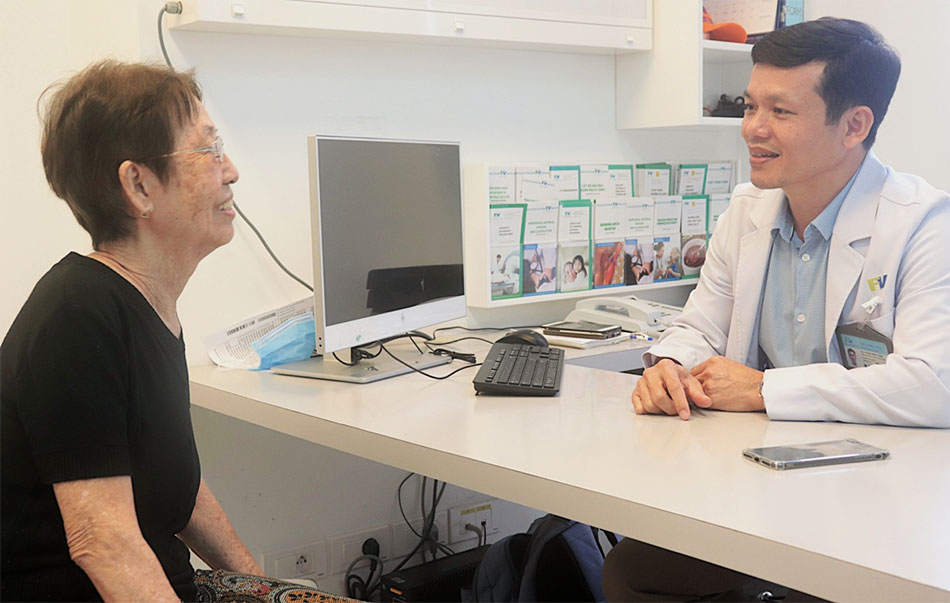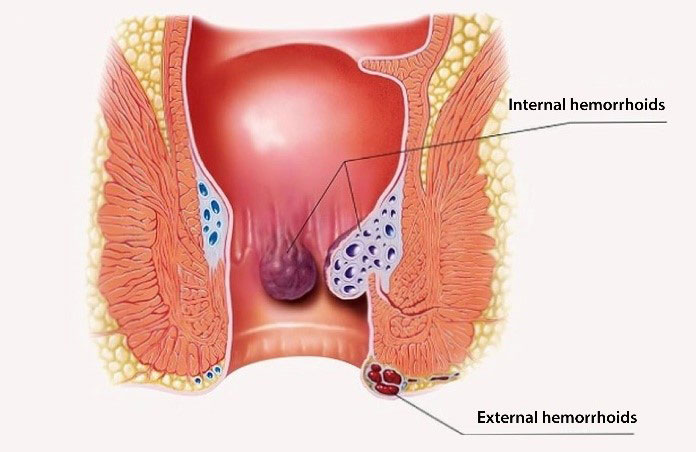Nearly 80% of patients at FV Hospital choose laser hemorrhoid surgery because it’s almost no pain after surgery with fast recovery time, low recurrence rate and fewer chances of complications. Based on the grade of hemorrhoids, FV Hospital doctors will choose the right treatment method for the patient.

The disease is benign but cannot be taken lightly
According to statistics of the Vietnam Association of Rectum, hemorrhoids are the most common disease among colorectal diseases with the rate of 35-50%. Particularly for the population group aged 40 and over, the prevalence of the disease accounts for 60-70% in Vietnam.

MSc. Dr.SLII. Phan Van Thai and a patient during an examination (Photo: FV).
MSc. Dr.SLII.. Phan Van Thai – Head of General Surgery Department of FV Hospital said that hemorrhoids are a benign disease, yet it causes discomfort to patients and can lead to complications, the most common symptoms are blood mixed in stools for a long time without recognition. Many patients have severe chronic anemia due to long-term recurrent bleeding, causing dizziness, fatigue, and poor health. Some severe cases of hemorrhoids can lead to complications of thrombosis, ulcers, skin infections around the anus… The more severe the hemorrhoids, the more difficult it is to treat and the higher the risk of complications after surgery. In fact, most patients tend to go to the doctor when the disease has progressed.
“The situation does not improve on its own, but most patients are embarrased and they feel that they can tolerate it, so they ignore it. By the time they have to go to the doctor, it is too severe. At that time, the treatment will be difficult,” said Dr. Thai.
Treatment of hemorrhoids is safe and effective depending on the grade
Besides genetics, hemorrhoids also come from mechanical factors that cause blood vessels in the anal area to stagnate and stretch such as pregnancy, sitting for a long time, constipation, eating spicy foods, drinking a lot of alcohol, beer, coffee, or having stress,…
According to the location of formation, hemorrhoids are divided into 3 types: internal hemorrhoids, external hemorrhoids and mixed hemorrhoids. Internal hemorrhoids are hemorrhoids that appear from above the dentate line (the serrated line, the boundary between the innermost layer of the anus and rectum). External hemorrhoids are hemorrhoids that appear below the dentate line and underneath the skin around the anal margin. Mixed hemorrhoids is a condition in which a patient has both internal and external hemorrhoids at the same time.
Hemorrhoids are classified according to anatomical origin and location of formation: external hemorrhoids and internal hemorrhoids. According to Dr. Thai, external hemorrhoids often manifest under acute thromboembolism, the patient can easily feel the swelling at the edge of the anus with a lot of pain because this is an area containing many nerve receptors and pain sensation. However, it can be easily treated by excision or simply by making an incision of the hemorrhoid to take thrombosis or just applying medicine and waiting for the clot to dissolve on its own in light cases.
Internal hemorrhoids are located inside the anal canal, so in the early stages, the patient cannot feel it and only detects when the hemorrhoids are enlarged. Current medicine divides internal hemorrhoids into 4 grades, based on the progression of the disease.
Grade 1 hemorrhoids: The blood vessels of hemorrhoids are swollen but still small, in the anal canal, the patient cannot feel it. Grade 2: Hemorrhoids were large and visible at the anal margin during defecation and then retracted into the anal canal. Grade 3 hemorrhoids: Hemorrhoids protrude out when represented and must be pushed inward by hand. Grade 4: Hemorrhoids often prolapse even when the patient does not have a bowel movement such as when squatting, doing heavy work or walking a lot.
Based on the grade of hemorrhoids, the patient will be prescribed by the doctor to choose the appropriate treatment method. Grade 1 hemorrhoids usually do not require treatment. Patients only need to understand the cause and adjust their diet and activities to prevent hemorrhoids from growing.
With grade 2 hemorrhoids, patients often have symptoms of discomfort, heaviness in the anal margin when defecating and may complications appear such as inflammation, itching, bleeding … At this time, the patient can consider treatment with minimally invasive methods such as rubber band ligation, sclerotherapy (injection of chemicals into hemorrhoid tissue to shrink the hemorrhoid) or a less invasive surgical approach such as laser surgery.
The less invasive methods of intervention, rubber band ligation, sclerotherapy have the advantage of the gentle treatment, but the success rate is not high, because only interventions with newly raised hemorrhoids, untreated hemorrhoids will still develop recur. Therefore, the indications for these methods are not popular. It can be applied to patients who are afraid of surgery and accept a high recurrence rate.
Laser treatment of hemorrhoids: No pain, low recurrence and few complications
The surgical treatment plan is when the patient has grade 3 and 4 hemorrhoids. There are many different hemorrhoid surgery methods, each with its own indications as well as certain advantages and disadvantages. Sometimes, it is necessary to apply many combined methods for a specific case of hemorrhoids, for example, mixed hemorrhoids may have to apply internal treatment by Longo method or Laser combined with excision of external hemorrhoids by classical methods.
Particularly, laser surgery, in addition to applying to grade 3 and grade 4 hemorrhoids, can also be applied to cases of grade 2 hemorrhoids with complications.
At FV Hospital, doctors are applying 3 main surgical methods including classic surgery, Longo surgery and Laser surgery.
In particular, laser surgery is considered a minimally invasive surgical method, which is widely used because of its optimal effectiveness.
Laser surgery to treat hemorrhoids has been applied globally for more than 10 years, and more and more countries are adopting it. Currently in France, laser surgery to treat hemorrhoids is applied more and more in hospitals specializing in hemorrhoids. In Vietnam, according to Dr. Thai, this surgery has been applied by FV for 5 years and gradually expanded in some other hospitals, due to its advantages.

Laser hemorrhoid surgery.
Laser surgery is performed under general or spinal anesthesia. The doctor will make a few small incisions (about 2mm) in the anal margin, corresponding to the position of the large hemorrhoids, through which the cable has a very small size of laser energy (about 1.5mm). It is inserted deep into the vascular bundles of the hemorrhoid. At that time, the doctor activates laser energy to burn, shrinking the dilated blood vessels.
The biggest advantage of this option is that there is almost no pain, no need to use pain relievers after surgery, except for a few cases where mild pain relievers can be used. Patients can go back to work about 2-3 days after surgery, the recurrence rate is low, there is no complication of postoperative anal stenosis.
As noted by Dr. Thai, currently nearly 80% of hemorrhoid surgery patients at FV choose Laser surgery due to the outstanding advantages of this method.
Doctor Phan Van Thai advises patients to go to the doctor early when there are symptoms of hemorrhoids. A special note in hemorrhoid surgery, according to Dr. Thai, is a complication of postoperative bleeding or infection of the perineum. Even in prestigious hospitals, there are still 2-3% of cases of bleeding after hemorrhoid surgery requiring emergency care. Therefore, doctors need to carefully monitor and advise patients before discharge after hemorrhoid surgery.
“If you think that hemorrhoid surgery is simple and accept to do it in a place where there are not enough facilities or aseptic conditions are not good, serious complications after hemorrhoid surgery such as bleeding and infection of the perineum are with higher chance and it might be life-threatening,” Dr. Thai added.
At FV, in addition to the expertise of doctors as well as modern treatment equipment, postoperative care and infection control are also one of the hospital’s top priorities for patient safety. Patients recover faster and reduce the rate of complications after surgery.



